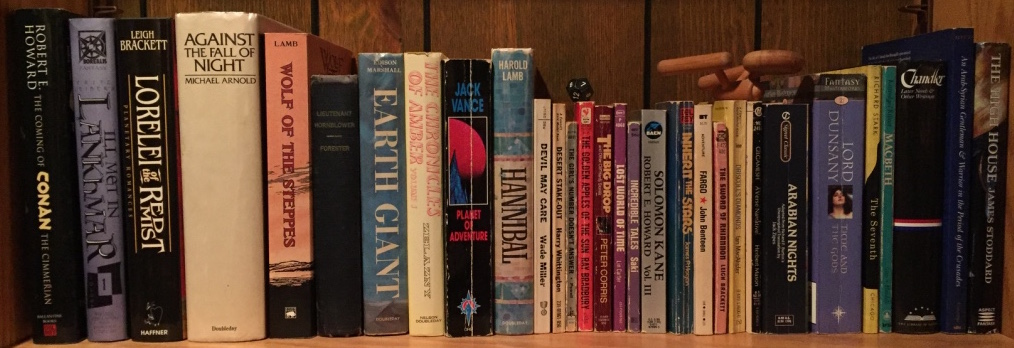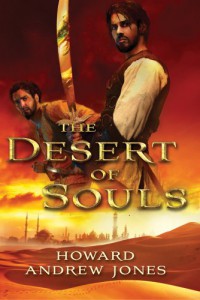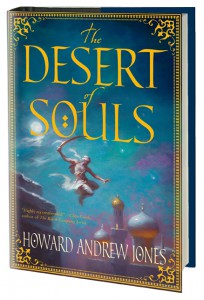
Most of my biggest influences.
 I am represented by the talented Bob Mecoy of the Bob Mecoy Literary Agency.
I am represented by the talented Bob Mecoy of the Bob Mecoy Literary Agency.
If you want to drop me a note, I can be reached at joneshoward (at) twc.com. Depending upon how close I am to deadline, some responses will be faster than others, although I’m unlikely to be interested in wiring money to Nigeria or taking you up on your low cost prescription drug offers at any time.
Here followeth the official bio in brief:
Howard Andrew Jones lives in a lonely tower by the Sea of Monsters with a wicked and beautiful enchantress. He’s the author of the Ring-Sworn heroic fantasy trilogy from St. Martin’s, starting with For the Killing of Kings, the critically acclaimed Arabian historical fantasy series starring Dabir and Asim (beginning with The Desert of Souls) and four Pathfinder novels. When he’s not editing Tales From the Magician’s Skull or hunched over his laptop mumbling about flashing swords and doom-haunted towers, you might find him lurking at www.howardandrewjones.com, where he blogs about writing craft, gaming, fantasy and adventure fiction, and assorted nerdery. Now and then he’s on FB at howard.andrew.jones.1, and he occasionally tweets @howardandrewjon.
 Here’s the more detailed biography:
Here’s the more detailed biography:
Howard Jones’s debut historical fantasy novel, The Desert of Souls (Thomas Dunne Books 2011), was widely acclaimed by influential publications like Library Journal, Kirkus, and Publisher’s Weekly, made Kirkus’ New and Notable list for 2011, and was on both Locus’s Recommended Reading List and the Barnes and Noble Best Fantasy Releases list of 2011. Its sequel, The Bones of the Old Ones, made the Barnes and Noble Best Fantasy Release of 2013 and received a starred review from Publisher’s Weekly. He is the author of four Pathfinder novels, an e-collection of short stories featuring the heroes from his historical fantasy novels, The Waters of Eternity, and the his Ring-Sworn trilogy from St. Martin’s, starting with For the Killing of Kings, which received a starred review from Publisher’s Weekly. and concluding with When the Goddess Wakes, which received the same recognition.
Howard was the driving force behind the rebirth of interest in Harold Lamb’s historical fiction, and assembled and edited 8 collections of Lamb’s work for the University of Nebraska Press. He served as Managing Editor of Black Gate magazine from 2004 onward, and still blogs regularly at the magazine web site. He is the Editor for the sword-and-sorcery magazine Tales From the Magician’s Skull, published by Goodman Games.
When not helping run his small family farm or spending time with his wife and children, he can be found hunched over his laptop or notebook, mumbling about flashing swords and doom-haunted towers. He’s worked variously as a TV cameraman, a book editor, a recycling consultant, and most recently, as a writing instructor at a mid-western college. He holds a third degree black belt in Shotokan karate.
Frequently Asked Questions
Are you related to some famous Jones? Or are you secretly THAT famous Jones?
I don’t think so. I use the middle name to distinguish me from the English pop star Howard Jones. My father used to tell me I was almost named Andrew Howard rather than Howard Andrew, which would have made it harder to distinguish me from the famous New Zealand cricket player with that very same name. So far as I know, I’m not related to either man, nor to writer Howard Mumford Jones, nor writer/historian Howard Jones, nor any other well-known Joneses. According to one family researcher, I’m remotely related to Nathaniel Hawthorne and James Fenimore Cooper, though I don’t recall the details.
I see your name mentioned in conjunction with Harold Lamb a lot. What’s that all about?
Harold Lamb was a talented historical fiction writer and, later, historian and biographer. I stumbled on his works when I was young and later learned that much of it had never been collected or reprinted. In the course of tracking it down I accidentally became an expert on the man’s writing, and it was my pleasure and honor to shepherd a number of collections of his work into print. Lamb was far ahead of his time in many ways, both in pacing and his sophisticated portrayal of non-westerners, and it’s my conjecture that he’s the unsung grandfather of modern sword-and-sorcery and heroic fiction.



 In May of 2010 I posted two short essays on the Black Gate web site about something that had been a kind of holy grail for me: obtaining a book deal with a major publisher. That first essay is about the power of making connections; the second concerns itself more with the specifics of my own novel contract. In this third essay I thought I’d talk a little about what happened once the book contract was signed.
In May of 2010 I posted two short essays on the Black Gate web site about something that had been a kind of holy grail for me: obtaining a book deal with a major publisher. That first essay is about the power of making connections; the second concerns itself more with the specifics of my own novel contract. In this third essay I thought I’d talk a little about what happened once the book contract was signed.



 Here’s the more detailed biography:
Here’s the more detailed biography: